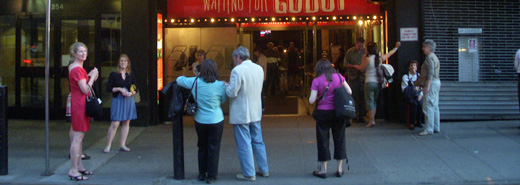Friday Movies:
Coco and Igor

Jan Kounen’s Coco and Igor is a superb homage to modernism at its zenith, and ought to be seen by anyone with the faintest interest in cultural history. (Which ought to be everybody!) Deploying two such iconic figures in the movement that it is hard to say which of them, in the end, amounts to the bigger hill of beans, the film underscores the pre-eminence in modern art of surface and style, its conviction that the best surfaces and styles hide nothing that’s important. In the process, this tale of a little-known amour demonstrates the connection between wilful candor and cruelty. The two protagonists, who believe in themselves as absolutely as it is given to human beings to believe in anything, are certainly aware of their impact upon public life, but that is not their primary consideration. They’re remaking the world to suit themselves, and the better they get at this, the worse it is for the people around them. It is almost ridiculous to speak of love between them.
Mr Kounen has been blessed with three superb principals: Anna Mouglalis never stops reminding us that Coco Chanel inaugurated an entirely new way of being a woman (which is why I’m inclined to award the palm to her character). The story adds that Chanel figured out how to make this new manner accessible to women who weren’t rich enough to be fashionable. That is the whole point of Chanel Nº 5, the promotion of which is nicely staged for us. (Not the discovery, by any means: the toiling of Dr Beaux and his staff at their airy laboratory in Grasse; that would detract from the toilings of Chanel in her Paris atelier, which are presented with an air of fey sorcery that breezes over the real designer’s hard work.)
Mads Mikkelsen is a touch too burly to be an altogether persuasive Stravinsky, but he certainly looks exotic in more or less the same way that the composer did. He is also a bit more sentimental around the edges than Stravinsky seems to have been. It’s hard to imagine Stravinsky’s having burst out, post-coitally, that his lover was only a “vendeuse” — a shopwoman. There’s a lèse-majesté in this insult, the majesty’s being Stravinsky’s own: what on earth would he be doing accepting the bounty of a shopwoman? The role of silently brooding musician is never lifted, here, out of its winding sheets of cliché, but, if we have to watch it, then watching Mr Mikkelsen’s screen presence causes the price to pay for this pleasure to evaporate.
The interesting role is the one that you think you’re going to dislike, that of Igor’s wife, Katarina. Yelena Morozova is the real reason to see Coco and Igor. The character of the wife who is not only wronged but forced to live under the same roof with her adulterous husband’s paramour is not perhaps such a cliché as we might think it to be, but one does dread the whining and the self-pity. Instead of which, Ms Morozova delivers a remonstrance to the couple’s amorality: she doesn’t just say that they’re wrong, she makes you agree. As the film rolls on, Ms Morozova’s forehead becomes higher and paler, to the point where she might sprout fiery wings and visit justice upon the sinners. Once Stravinsky has delivered that insult to Chanel, you have to wonder what the point of all this selfishness might be.
The scene which ends with this sour note is an interesting contrivance. We see, from above, the naked Mr Mikkelsen covering Ms Mouglalis, their brawny sinews constrasting sharply with the black-and-white and stylized floral décor of their lovenest. As the camera descends, the disorder of the actor’s hair strikes an ever blowsier contrast with the room. There appears to have been no way to modernize the surface of carnality — which may be why, after several decades of trying, the mandarins gave up hoping that it would make for a better world.
There is actually a second reason to see this film, and that is the opening episode, which, like so many opening episodes these days, isn’t at all essential to the story; powerful as it is, I’m not even sure that it sets a tone for what follows. The story of Coco and Igor takes place in 1920, when Chanel was becoming truly rich while Stravinsky was impoverished by the Russian Revolution. There is no need to recreate the premiere, seven years earlier, of Stravinsky’s Le sacre du printemps, an enormously famous cultural event. But Mr Kounen has recreated it so well that it is more shocking that you expect it to be. The eerie music begins, and the odd choreography bewilders the audience; but gradually, and horribly, the action moves into the house, as partisans of and against modernism all but bring the gutter into the theatre. As a scene of social disaster, I have never seen the like. Tendentious as Mr Kounen’s narration might be, it impossible to come away without backdating the outbreak of World War I by a year.










